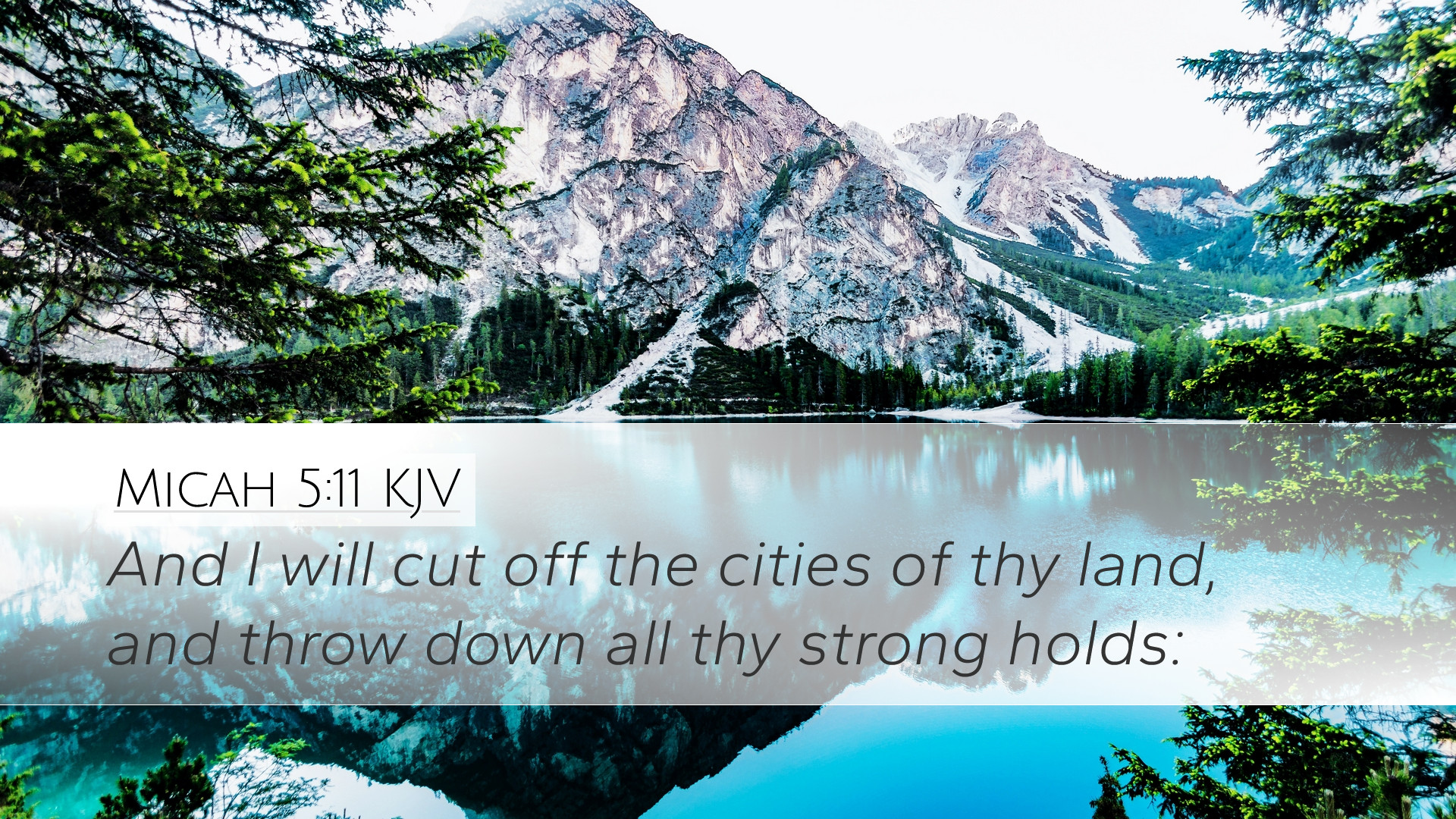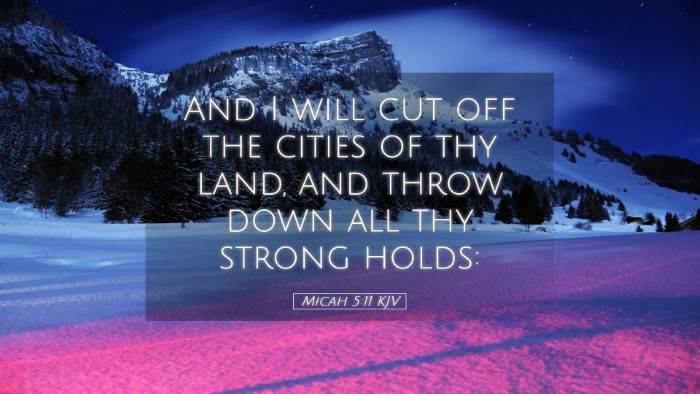Old Testament
Genesis Exodus Leviticus Numbers Deuteronomy Joshua Judges Ruth 1 Samuel 2 Samuel 1 Kings 2 Kings 1 Chronicles 2 Chronicles Ezra Nehemiah Esther Job Psalms Proverbs Ecclesiastes Song of Solomon Isaiah Jeremiah Lamentations Ezekiel Daniel Hosea Joel Amos Obadiah Jonah Micah Nahum Habakkuk Zephaniah Haggai Zechariah MalachiMicah 5:11
Micah 5:11 KJV
And I will cut off the cities of thy land, and throw down all thy strong holds:
Micah 5:11 Bible Commentary
Commentary on Micah 5:11
Verse: "And I will cut off the cities of thy land, and throw down all thy strongholds." (Micah 5:11)
Contextual Overview
The prophecy of Micah comes at a critical juncture in the history of Israel, particularly Judah, amidst the political turmoil and moral decline of the time. The impending judgment is a central theme of this chapter, where the Lord speaks through Micah regarding the coming of the ruler from Bethlehem and the consequent judgment on various nations.
Insights from Various Commentaries
Matthew Henry's Concise Commentary
Matthew Henry emphasizes the contrast between the divine promise of the coming Messiah and the destruction that would befall the cities of Israel. This verse reflects God’s sovereignty in judgment as He purposefully brings down the strongholds of those who oppose His plans and purposes. Henry posits that the destruction of the cities highlights God's justice against sinful structures that lead His people astray.
- Divine Sovereignty: God's authority is evident as He determines the fate of cities and strongholds, enforcing His divine justice.
- Symbolism of Cities: The cities symbolize not just geographical locations but also the systems of rebellion against God.
- Hope in Judgment: Despite the harshness of the prophecy, there remains a thread of hope in the coming Ruler who will shepherd His people.
Albert Barnes' Notes on the Bible
Barnes focuses on the dual aspects of the prophecy, which warns of impending judgment while simultaneously announcing hope through the future messianic leader from Bethlehem. The imagery of cutting off cities and strongholds signifies a removal of earthly foundations and powers that fail to align with God’s will. Furthermore, he points out that this judgment served as a precursor to restoration—a necessary consequence for later redemption.
- Destruction as Pruning: Just as a gardener prunes plants for their growth, so too is God preparing His people for a greater blessing by removing what leads them away from Him.
- Redeeming Judgment: Barnes notes the importance of understanding the interconnectedness between judgment and the hope of restoration, as central to God's character and plan.
- Losing Strongholds: The reference to strongholds implies not merely physical fortifications but also the spiritual fortifications of sin, pride, and rebellion that keep people entrenched in disobedience.
Adam Clarke's Commentary
Adam Clarke offers a detailed exploration of the implications of divine judgment concerning the cities and strongholds referenced in Micah 5:11. Clarke invokes the historical context, reflecting on the Assyrian threat to Israel, which can be seen as an instrument of divine judgment. Moreover, Clarke emphasizes the fulfillment of these prophecies through historical events that lead to the eventual restoration of God's people.
- Historical Fulfillment: Clarke suggests that the prophecy has both immediate and future repercussions, with a dual application in that the judgment starts with Israel but is also applicable globally.
- Spiritual Interpretation: He illustrates the spiritual significance of the cities as representing the hearts of the people. When God cuts off these cities, there is a call for introspection and repentance among the people of God.
- Focus on Deliverance: Clarke affirms that the central message is one of trust in divine providence; the assurance comes that God will ultimately deliver His people through the promised Messiah.
Theological Implications
The verse calls for deep theological reflection on themes of divine judgment, justice, and mercy. It serves as a reminder for believers about the need for genuine repentance and an acknowledgement of the areas in their lives that may resemble the cities and strongholds mentioned.
- Repentance Required: The judgment upon the cities of the land implores believers to forsake their strongholds of sin, pride, and autonomy, submitting to God's sovereignty.
- Looking to the Future: The coming hope through the Messiah points to the importance of eschatological focus, wherein believers are urged to anticipate God's ultimate plan of restoration.
- Active Trust in God: Recognizing the instability of human constructs, pastors and theologians are encouraged to center their teaching on the solid foundation of Christ as the secure stronghold for the people of God.
Conclusion
Micah 5:11 serves as a sober reminder of the interplay of judgment and grace, revealing God’s unyielding stance against sin while simultaneously pointing to the future hope of redemption through the Messiah. Thus, it is both a warning and a promise, a call to repentance for the believer, and a reassurance of God's faithfulness through all generations.


